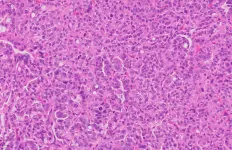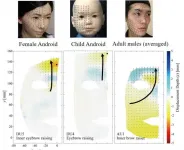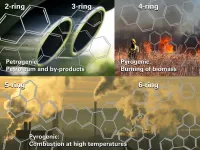Lung cancer resistance: the key is glucose
2021-03-22
(Press-News.org) Cancers are not only made of tumor cells. In fact, as they grow, they develop an entire cellular ecosystem within and around them. This "tumor microenvironment" is made up of multiple cell types, including cells of the immune system, like T lymphocytes and neutrophils.
The tumor microenvironment has predictably drawn a lot of interest from cancer researchers, who are constantly searching for potential therapeutic targets. When it comes to the immune cells, most research focuses on T lymphocytes, which have become primary targets of cancer immunotherapy - a cancer therapy that turns the patient's own immune system against the tumor.
But there is another type of immune cell in the tumor microenvironment whose importance in cancer development has been overlooked: neutrophils, which form part of the body's immediate or "innate" immune response to microbes. The question, currently debated among scientists, is whether neutrophils help or inhibit the tumor's growth.
Now, a team of researchers led by Etienne Meylan at EPFL's School of Life Sciences has discovered that the metabolism of neutrophils determines their tumor-supportive behavior in lung cancer development. The study is published in Cancer Research, a journal of the American Association for Cancer Research.
What intrigued the scientists was that cell metabolism in cancer becomes deregulated. Being neutrophil specialists, they considered the possibility that when these cells reside within the tumor microenvironment, their metabolism may also change, and that could affect how they contribute to the cancer's growth.
Focusing on glucose metabolism in a genetically-engineered mouse model of lung adenocarcinoma, the scientists isolated tumor-associated neutrophils (TANs) and compared them to neutrophils from healthy lungs.
What they found was surprising: the TANs take-up and metabolize glucose much more efficiently than neutrophils from healthy lungs. The researchers also found that TANs express a higher amount of a protein called Glut1, which sits on the cell's surface and enables increased glucose uptake and use.
To understand the importance of Glut1 in neutrophils during lung tumor development in vivo, we used a sophisticated system to remove Glut1 specifically from neutrophils," says Pierre-Benoit Ancey, the study's first author. "Using this approach, we identified that Glut1 is essential to prolong neutrophil lifespan in tumors; in the absence of Glut1, we found younger TANs in the microenvironment."
Using X-ray microtomography to monitor adenocarcinomas, the researchers found that removing Glut1 from TANs led to lower tumor growth rate but also increased the efficacy of radiotherapy, a common treatment for lung cancer. In other words, the ability of TANs to metabolize glucose efficiently seems to bestow the tumor with the ability to resist treatment - at least in lung cancer.
The scientists think that, because Glut1 loss diminishes the lifespan of TANs, their "age" determines whether they play a pro- or anti-tumor role. "Usually, we don't know how to target neutrophils, because they are so important in innate immunity," says Etienne Meylan. "Our study shows that their altered metabolism in cancer could be a new Achilles heel to consider in future treatment strategies. Undoubtedly, we are only beginning to learn about these fascinating cells in cancer."
INFORMATION:
[Attachments] See images for this press release:

ELSE PRESS RELEASES FROM THIS DATE:
2021-03-22
Wikipedia page views could be used to monitor global awareness of biodiversity, proposes a research team from UCL, ZSL, and the RSPB.
Using their new metric, the research team found that awareness of biodiversity is marginally increasing, but the rate of change varies greatly between different groups of animals, as they report in a paper included in an upcoming special section of Conversation Biology.
Lead author, PhD student Joe Millard (UCL Centre for Biodiversity & Environment Research, UCL Biosciences and Institute of Zoology, ZSL) said: "As extinctions and biodiversity losses ramp up worldwide, largely due to climate change and other human actions, it's vital that ...
2021-03-22
A study by the Dian Fossey Gorilla Fund shows that gorilla families come together to support young gorillas that lose their mothers.
The findings, published in the journal eLife, use the Fossey Fund's more than 50-year dataset to discover how maternal loss influences young gorillas' social relationships, survival and future reproduction. The study shows when young mountain gorillas lose their mothers, the rest of the group helps buffer the loss by strengthening their relationships with the orphans.
"Mothers are incredibly important for survival early in life--this is something that is shared across all mammals," said lead author Dr. Robin Morrison. "But in social mammals, like ourselves, mothers often continue to provide vital support up to adulthood and even beyond."
"In ...
2021-03-22
Osaka, Japan - Researchers from the Graduate School of Engineering and Symbiotic Intelligent Systems Research Center at Osaka University used motion capture cameras to compare the expressions of android and human faces. They found that the mechanical facial movements of the robots, especially in the upper regions, did not fully reproduce the curved flow lines seen in the faces of actual people. This research may lead to more lifelike and expressive artificial faces.
The field of robotics has advanced a great deal over the past decades. However, while current androids can appear very humanlike at first, their active facial expressions may still be unnatural and slightly unsettling to us. The exact reasons ...
2021-03-22
Although cancers that occur in the gallbladder or bile ducts are rare, their rates are increasing. A recent study provides details on the burden of gallbladder and biliary tract cancer (GBTC) across 195 countries and territories from 1990 to 2017. The findings are published early online in CANCER, a peer-reviewed journal of the American Cancer Society.
Determining GBTC estimates and trends in different global regions can help to guide research priorities and policies for prevention and treatment. With this in mind, a team of scientists examined publicly available information ...
2021-03-22
Patient care by a single primary care physician is associated with many health benefits, including increased treatment adherence and decreased hospital admissions and mortality risk. But can the relationship built between doctor and patient also lead to unnecessary care?
A new University of Florida study finds that male patients who have a single general physician were more likely to receive a prostate cancer screening test during a period when the test was not recommended by the US Preventive Services Task Force. The study, which appears in END ...
2021-03-22
When power stations burn coal, a class of compounds called Polycyclic Aromatic Hydrocarbons, or PAHs, form part of the resulting air pollution. Researchers have found that PAHs toxins degrade in sunlight into 'children' compounds and by-products.
Some 'children' compounds can be more toxic than the 'parent' PAHs. Rivers and dams affected by PAHs are likely contaminated by a much larger number of toxins than are emitted by major polluters, researchers show in Chemosphere.
A coal-fired power station and a cigarette have more in common than one might think. So do the exhaust pipes from cars and burning crop residues. The same is true for an aeroplane passing high over a wildfire ...
2021-03-22
Human actions are threatening the resilience and stability of Earth's biosphere - the wafer-thin veil around Earth where life thrives. This has profound implications for the development of civilizations, say an international group of researchers in a report published for the first Nobel Prize Summit, a digital gathering to be held in April to discuss the state of the planet in the wake of the COVID-19 pandemic.
"Humanity is now the dominant force of change on planet Earth," according to the analysis published in Ambio, a journal of the Royal Swedish Academy of Sciences.
"The risks we are taking are astounding," says co-author Johan Rockström, director of the Potsdam Institute for Climate Impact Research and co-author of the analysis. "We are at the dawn of what must be a transformative ...
2021-03-22
Study taken throughout the pandemic shows those who feel government should be less controlling believe COVID-19 poses less risk, which in turn was associated with the adoption of fewer protective behaviours
"A fearful population is not necessarily desirable... people may be underestimating or overestimating the actual risk at different times."
People's politics and values are exerting a bigger influence on how much of a threat they feel from COVID-19 compared to objective indicators such as the number of confirmed cases.
That's the finding of a new University of Cambridge survey which measured how attitudes to the coronavirus have varied over the course of 10 months of the pandemic for more ...
2021-03-22
Hearing loss and other auditory problems are strongly associated with Covid-19 according to a systematic review of research evidence led by University of Manchester and NIHR Manchester Biomedical Research Centre (BRC) scientists.
Professor Kevin Munro and PhD researcher Ibrahim Almufarrij found 56 studies that identified an association between COVID-19 and auditory and vestibular problems.
They pooled data from 24 of the studies to estimate that the prevalence of hearing loss was 7.6%, tinnitus was 14.8% and vertigo was 7.2%.
They publish their findings in the International Journal of Audiology.
However, the team - who followed up their review carried out a year ago - ...
2021-03-22
Scientists from the University of Leeds's Nutritional Epidemiology Group used data from 500,000 people, discovering that consuming a 25g serving of processed meat a day, the equivalent to one rasher of bacon, is associated with a 44% increased risk of developing the disease.
But their findings also show eating some unprocessed red meat, such as beef, pork or veal, could be protective, as people who consumed 50g a day were 19% less likely to develop dementia.?
The researchers were exploring a potential link between consumption of meat and the development of dementia, a health condition that affects 5%-8% of over 60s worldwide.
Their results, titled Meat consumption and risk of incident dementia: cohort study of 493888 UK Biobank participants, are published today in the American ...
LAST 30 PRESS RELEASES:
[Press-News.org] Lung cancer resistance: the key is glucose


